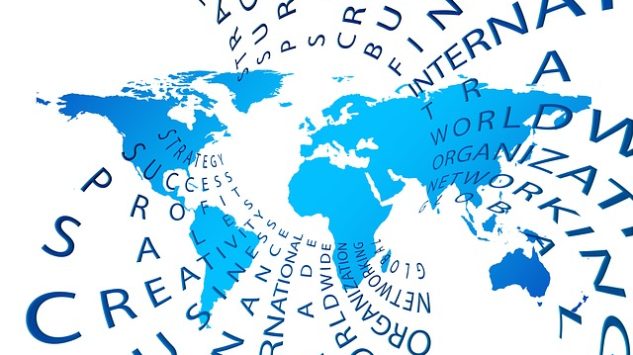Issue Briefs

Where have all the Supranational Institutions gone?
Martin Sieff
June 4, 2019
It has been a liberal democratic mantra endlessly repeated by supposedly wise men and women for three quarters of a century and relentlessly subscribed to the great and mighty of the world: The Age of the Nation State is Over. Every year, endless conferences and institutions from New York to Geneva and Davos repeat it by rote. The accepted narrative goes like this: “The Problems the World Faces have become Too Great and Too Complex to be tackled by any nation-state or collation of nation-states acting in concert. The World Must Come Together to solve its problems”
There is only one far from small problem with this almost universally held faith.
It isn’t true.
Busy agenda
The Supranational Creed was cooked up in the closing years of World War II by European exiles and US government bureaucrats admirably eager to end the cycles of repeated, hideous wars that had torn Europe and Asia apart in the first half of the 20th century. They set up the United Nations and back in the 1950s eagerly worked to create the six nations nucleus of the European Common Market that eventually grew into today’s European Union.
At the end of the Cold War, the Supranational Creed appeared to have triumphed and in the decades that followed mighty new structures were rapidly created.
The North American Free Trade Agreement (NAFTA) was completed in 1994. The following year, the World Trade Organization was founded. The Clinton administration in the United States, direct political and intellectual heirs of President Franklin D. Roosevelt and his free trade-obsessed Secretary of State Cordell Hull, a key architect of the United Nations, was in the forefront of erecting both structures.
In the year 2000, this long, 20th century drive to erect supranational structures seemed to achieve one of its most momentous steps when China jointed the WTO.
Walls and barriers between nations were out of fashion since the destruction of the Berlin Wall at the end of 1989 and they were looked on as admissions of defeat like the English King Canute a thousand years ago trying in vain to order an advancing sea tide to turn back.
In fact, Canute understood the cyclic nature of tides perfectly well, and was carrying out a joke against his own flattering courtiers who were claiming he had godlike powers.
A reversal of the tide
Just as sea tides reverse their course every day depending on how the earth rotates and affects the gravitational pull of the Moon, political fashions wax and wane too. What we have been seeing through the first two decades of the 21st century is a reversal of the tide of supranational entities that so determined the political course of the second half of the 20th century.
Repeatedly, nation states have been coerced, persuaded or even swindled into surrendering key sovereign powers to supranational entities across a wide range of issues from economics to control of their own borders and immigration to climate change.
Leaders who stood out against the trend like President Vladimir Putin of Russia, and Prime Minister, later President Recep Tayyip Erdogan of Turkey were flayed by the supposed “great and good, the “virtuous” liberal internationalists in one global forum after another. Especially in the Anglo-American world, such publications as the Wall Street Journal, the New York Times and the Washington Post in the United States and The Guardian, The Economist and the Financial Times in the United Kingdom repeated the mantra. If liberal free trade, open borders internationalism overseen by supranational entities were not doing the job properly, that was because nation states were staying too selfish and too strong. The wider the international order was extended, the better things would be.
Except it hasn’t worked out that way.
The global supranational order did not deliver
Today, the international drug trade is far vaster, more serious, wealthier and more powerful than anytime in recorded history. It has survived a full-scale civil war costing at least 40,000 lives with the effective and otherwise powerful central federal government of Mexico since the beginning of the century and defies the vast and confusing panoply of US law enforcement agencies with impunity.
The horrible scourge of human trafficking, the bartering of (especially) women and young children of both sexes for illicit use is also now more widespread than ever before in the history of the world.
The Geneva-based and widely respected International Labour Organization (ILO) estimates the global profits of this illicit trade to run at $99 billion per year – eleven times the figure for 2005.
Backlash
In addition, we see throughout the world, especially across the Northern Hemisphere, an enormous resurgence of populist, nationalist movements, protests and anger against the impact of unregulated free trade and unlimited immigration policies. The “great and the good” always have the same answer to such protests: They claim that a narrow number of sore losers are blind to the broader overall benefits that their enlightened policies are producing.
But that claim is as much a reiteration of blind, unreasoning faith as any medieval protestation that the Earth is flat or that the Sun rotates around the Earth, rather than the other way around.
All the empirical evidence is clear. Nation states that have retained strong control over their immigration and trade have survived and prospered. Some, most notably Russia that appeared to be disintegrating in the last decade of the 20th century have become stronger than ever, not just in military power but in achieving gigantic gains in prosperity and economic security for their own people.
China, in 40 years of constructive engagement with the West but retaining very strong control over its import policies (despite being in the WTO for the past 19 years) has seen its per capita income rise for its 1.3 billion people from $200 to $10,000 – The greatest and longest such gain for so many human beings in the recorded history of the world.
This was achieved not by surrendering the power of the national government, but by using it responsibly and forcefully to take advantages of conditions in the global market place.
United Nations failed, EU weakened
By contrast, the United Nations has failed to make any significant progress in applying supranational power whatsoever. On the few occasions its leaders have persuaded nation state leaders to let the UN organize any significant initiative the results have been derisory or far worse, most notably the failed UN peacekeeping role in Rwanda in 1994 that failed to prevent the genocidal slaughter of up to a million people, mainly Tutsis by Hutu tribe militants in just over three months.
Today, the European Union is either disintegrating or going through the throes of a systematic, continent wide crisis of protest and rejection.
The United Kingdom in June 2016 voted to leave the EU entirely, and the next UK prime minister to replace outgoing Theresa May is expected to accelerate that process if possible starting this year. France remains torn by nationwide protests against the austerity and open border, free trade policies of President Emmanuel Macron. The candidate he defeated in the 2017 French presidential election, Marine Le Pen, has just made a stunning comeback with her National Rally party trouncing Macron’s supporters in the elections to the European Parliament.
Italy is now ruled by a prime minister openly hostile to and rejecting of EU-mandated policies on immigration and much else. The government of Hungary under repeatedly democratically reelected Prime Minister Viktor Orban defies Brussels on a wide range of issues with impunity. And Spain faces the extraordinary threat of civil war from the attempted secession of its most prosperous province Catalonia as an independent state.
Western societies no longer buy Supranationalism
The bottom line is clear: Whenever national governments took the Supranational Creed seriously, as with the members of the EU, those central governments became far weaker and their publics’ resentment rapidly grew against both them and the supposedly stronger supranational one they had surrendered their authority to.
The United States, whose government championed and supported the Supranational World System more than any other nation, saw in 2016 a nationalist-populist candidate win the presidency to the astonishment and horror of its own national elite.
By contrast, governments that stand aside from the Supranational Creed and its organizations like Russia, Turkey and Iran – or that only pay lip service to it while pursuing their own national interests like China and India – go from strength to strength.
Universal standards do not work
Western leaders – especially in such organizations as the WTO, the UN, NATO and the EU – would do well to put a brake on their excessive capacity to moralize and seek to impose their own beliefs as universal standards on the rest of the world. Far from turning the tide of world affairs back, they are proving themselves far more stupid than wise and witty old King Canute did a thousand years ago.
There are tides in the affairs of human beings which, taken at the flood, lead on to fortune, as Shakespeare notably had a character comment in his play Julius Caesar. To deny the reality of such global tides is to risk drowning in them.
 |
Martin Sieff is a Global Policy Institute Fellow. He is author most recently of Gathering Storm: The Seventh Era of American History and the Coming Crises That Will Lead to It. |
The views and opinions expressed in this issue brief are those of the author.